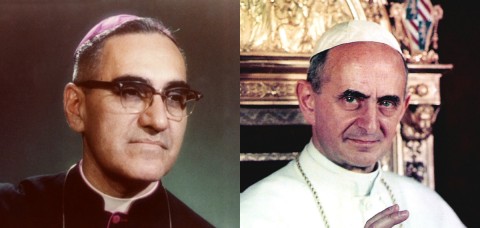Óscar Romero and Paul VI now Catholic saints
The Salvadoran archbishop and Vatican II–era pope were among the most prominent and controversial figures of the Catholic Church in the 20th century.

Salvadoran archbishop Óscar Arnulfo Romero and Pope Paul VI were canonized on October 14 at the Vatican in a ceremony in which five others were also made saints.
Francis said of Romero after his canonization that he “knew how to perfectly embody the image of the Good Shepherd, who gave his life for his sheep,” Vatican News wrote.
Romero is primarily known for his three years as archbishop from 1977 until he was martyred while celebrating mass in March 1980. El Salvador’s Truth Commission concluded that the murder was ordered by a U.S.-trained death squad leader; the case was reopened in 2017.
Romero was “a tireless advocate for the poor, who decried state-sponsored repression as acts of terror—intimidation, kidnapping, torture, and murders carried out by paramilitary death squads—multiplied,” wrote J. Scott Jackson in a recent Christian Century article. “He never condoned the retributive violence of the guerrilla groups, and he urged oligarchs to repent and embrace the gospel of love.”
Read our latest issue or browse back issues.
Romero was influenced by Paul VI, who met with Latin America’s bishops in Colombia in 1968, the National Catholic Reporter wrote, “where they proclaimed ‘God’s option for the poor’ and challenged the entrenched structural injustices that were causing widespread poverty and violence in the region. Romero found further support from Paul VI’s 1975 exhortation on evangelization, Evangelii nuntiandi, which strongly affirmed liberation from oppression as integral to the church’s mission.”
In a homily the day before he died, “The Church in Service of Personal, Community, and Transcendent Liberation,” Romero spoke of a letter he had sent President Jimmy Carter requesting an end to U.S. military assistance that was funding the repression. He appealed to men in El Salvador’s army to uphold God’s law by refusing orders to kill their own people.
He preached that “the true liberators of our people must come from us Christians, from the people of God. Any historical plan that is not based on . . . the dignity of the human being, the love of God, the kingdom of Christ among people will be a fleeting project.”
Romero and Paul VI were among the most prominent and controversial figures of the Catholic Church in the 20th century, and each was a major influence on Pope Francis, according to the Associated Press.
“It was Paul’s 1968 encyclical Humanae vitae that marked his papacy, reaffirming the church’s opposition to artificial contraception,” the AP wrote. He also “presided over the final sessions of Vatican II, the tumultuous 1962–65 church meetings that modernized the Catholic Church and opened it up to the world, allowing liturgy to be celebrated in the vernacular rather than in Latin and calling for greater roles for the laity and improved relations with people of other faiths.”
A version of this article appears in the print edition under the title “People: Óscar Arnulfo Romero and Paul VI.”




